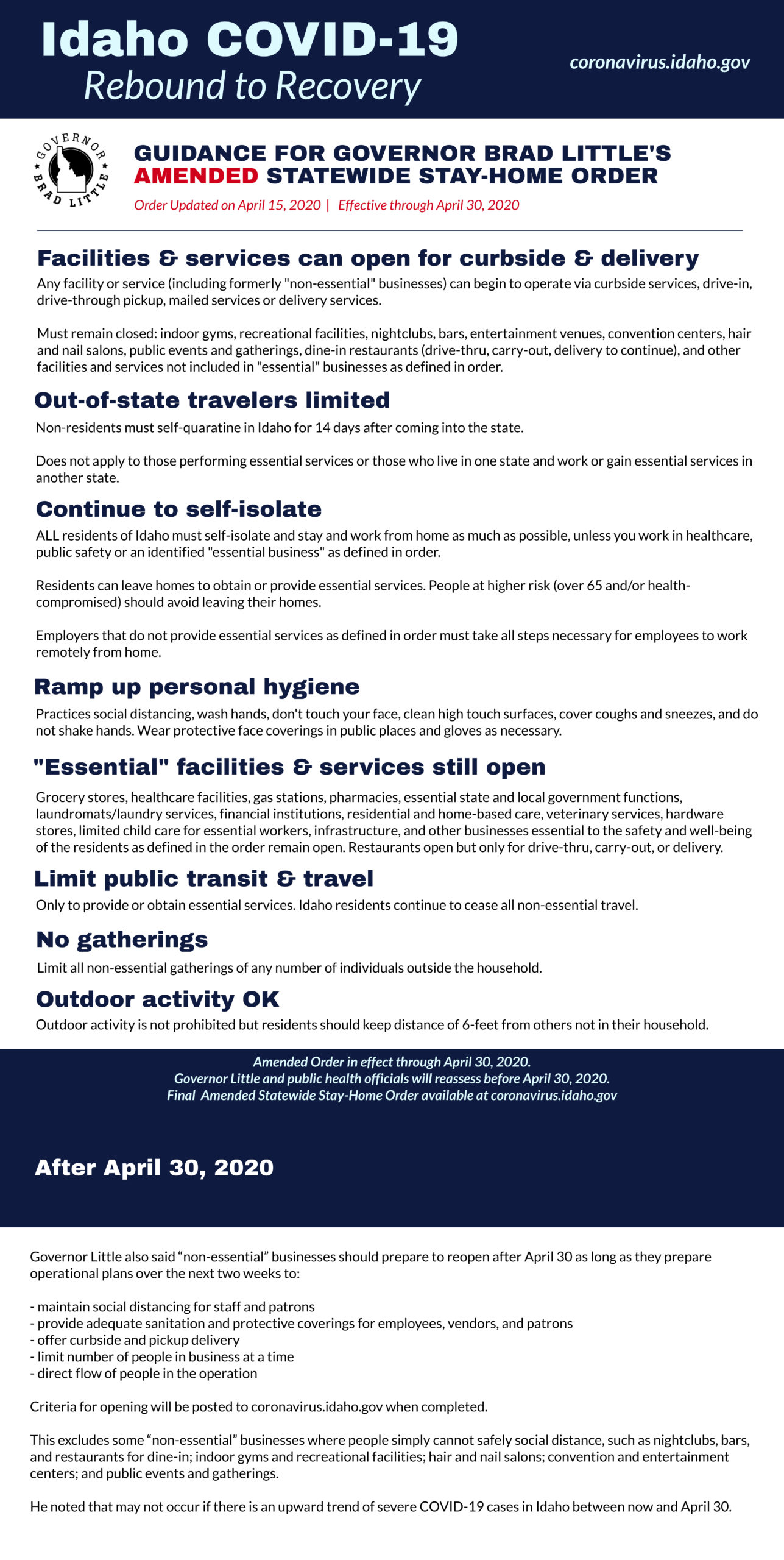Governor Little extends stay-at-home order through April 30 with exceptions
BOISE, Idaho (KIFI/KIDK) - Governor Brad Little extended the stay-home order through April 30 during a press conference Wednesday. You can watch that press conference below.
"Idahoans should continue to practice all the behaviors they've been doing since March 25," Little said.
Little said the extension was necessary to ensure the state continues to slow the spread of coronavirus, preventing health care facilities from being overwhelmed and hopefully hastening the end of the pandemic.
However, Governor Little amended the order to allow some previously designated nonessential facilities and services like flower, jewelry and other retail shops, to open and offer curbside services between now and April 30.
Many previously identified nonessential services may prepare to reopen after April 30 if they do the following:
- Maintain social distancing for staff and patrons
- Provide adequate sanitation and protective covering for employees and patrons
- Limit the number of people in the business at a time
- Direct the flow of people in the operation
- Offer curbside pickup and delivery
This does not apply to nonessential businesses where people can not safely social distance like nightclubs, bars, restaurant dining, indoor gyms and recreational services, hair and nail salons and public events and gathers.
"Continuing to do that is the right thing to do," Little said.
Also, the amended order requires out of state travelers to self-quarantine for 14 days after entering Idaho.
Excluded from this are people who perform essential services and those who live in one state and work or gain essential services in another.
"Nobody wants to get Idaho back to work more than me," Little said.
He said the goal is to get most businesses open after the end of the month.

Little issued an emergency declaration on March 13 and followed with the 21-day statewide stay-home order on March 25. At the time of the order, Idaho had at least 91 confirmed cases of COVID-19, and two known instances of community spread. Community spread is when the source of a person's infection can't be determined.
It had 1,473 virus cases and 39 deaths as of Wednesday morning, according to a Johns Hopkins University tally.
"The statewide stay-home order is working to slow the spread of coronavirus, and Idaho will be better positioned for a strong economic comeback because we are making difficult changes in how we live and work in the short-term," Little said Tuesday.Little said they will evaluate the order again at the end of the month.
Between mid-March and early April, the Idaho Department of Labor said, nearly 78,000 people filed for unemployment benefits as the state shed thousands of jobs.
Some top GOP lawmakers, including Speaker of the House Scott Bedke, have been pressing Little to hand control of the coronavirus response over to local officials.
Bedke is from the tiny town of Oakley in Cassia County, which on Wednesday morning only had 10 confirmed cases. Still, tests remain very limited and nearly one-tenth of all the tests given are positive for the virus. With the limited number of tests and the chance that some tests return false negative results, the number of actual cases is believed to be much higher.
Republican Party Chairman Raul Labrador, a former U.S. representative and unsuccessful gubernatorial candidate against Little, has also pressured him to lift the order.
"The decision to reopen Idaho must be based on a complete analysis of the costs to our society and not just COVID-19 models," Labrador said in a prepared statement.
Little said he had to do what is right.
"I'm always concerned and interested in the opinions of the duly elected legislators in Idaho, but as I view my responsibility on a statewide basis," Little said. "I gotta do what I gotta do for the state of Idaho."
Memos, emails and other documents from Little's office obtained by The Associated Press through a public records request illustrates just how interconnected local governments are. When it comes to managing a pandemic, a decision by one municipality -- or even a large business -- can have broad impacts on neighboring towns and health systems.
When a YMCA organization emailed all of its members to alert them to a COVID-19 concern, clinics in the area were subsequently flooded with calls and visitors, according to documents from an Emergency Operation Center Meeting on March 15. Before the statewide order was issued, city leaders in small towns like Crouch were also dealing with people from neighboring cities overwhelming the small local grocery store, stocking up on items and leaving shelves depleted, according to an email from Sheila Christensen with the Association of Idaho Cities. Questions were also coming to the governor's office about the potential liability mayors could face if they issue closure orders, particularly for businesses that the state already must license like food establishments.
You can view the amended order HERE.





